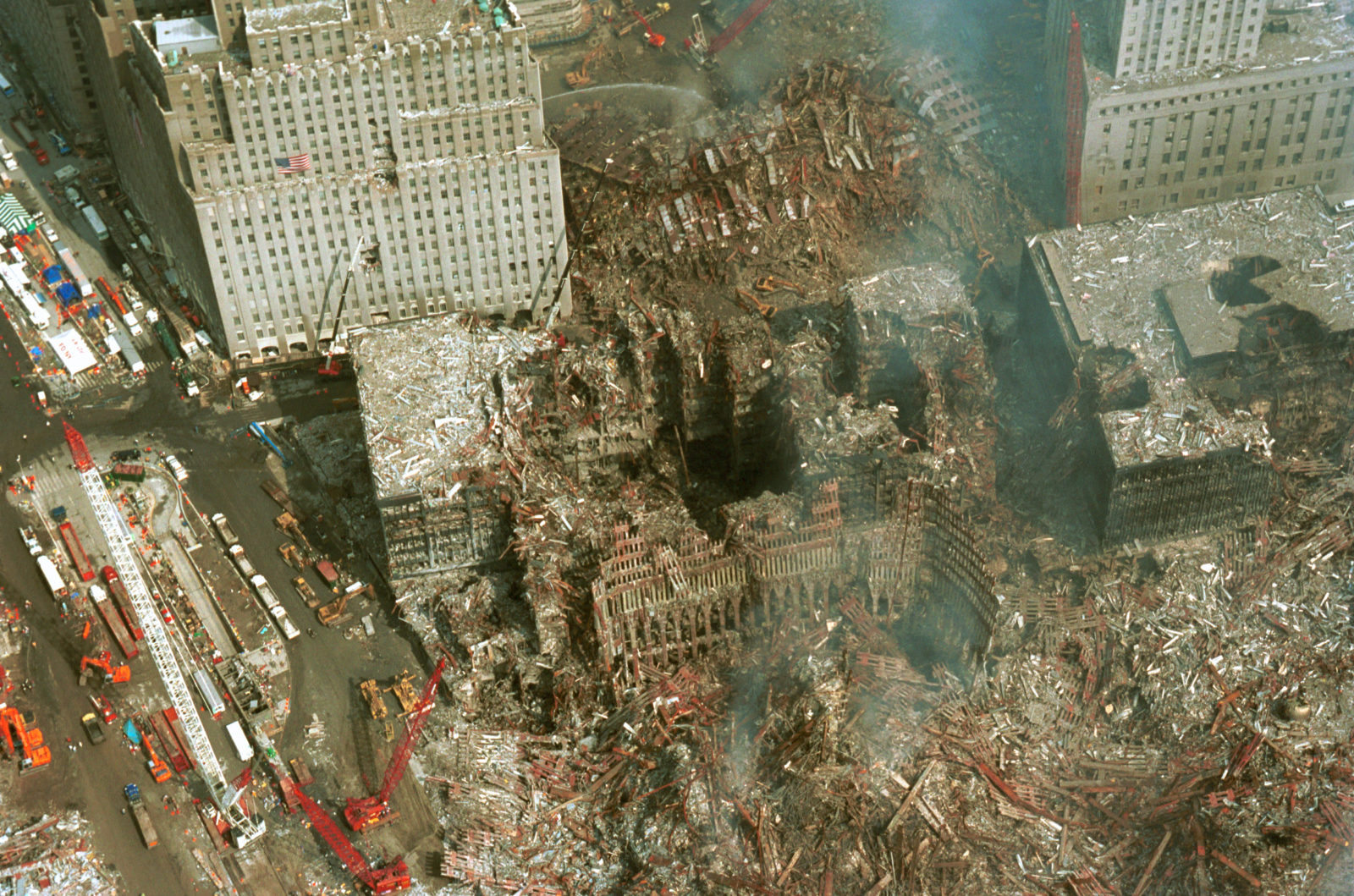USHS Blog
Secure Remembrance. 9/11 Fifteen Years On
It was hard to miss that 11 September 2001, the airplane hijackings and attacks on the Twin Towers and Pentagon, took place exactly fifteen years ago. Large commemorations were held all over the US, with some media scavenging for controversy days in advance and in unlikely places. To mark the occasion further, today, New York’s 9/11 Memorial Museum opens its first art exhibit, ‘Rendering the Unthinkable: Artists Respond to 9/11’. Fifteen years after the fact, it apparently is time to start rendering 9/11 from something ‘unhealed’ and unthinkable into something that can be made sense of aesthetically. This means we can also question what we ought to commemorate anyway, whether it makes sense to think of 9/11 as a stand-alone moment in time, a shocking, gruesome or spectacular moment in itself.
In 2016 we may wonder why this date is officially remembered in such a way, while the longer chains of events and changes that are related to 9/11 are not commemorated at all. In official commemorations, like those organised by the US government, the focus on the victims that fell on American soil amounts to an almost total disregard of the people that were victimized by military interventions and security policies elsewhere in the wake of 9/11. Especially at the fifteen year mark, we ought to make our commemorations more inclusive and rethink the repercussions of post-9/11 security policies.

Ruins of the Twin Towers, source: Wikimedia Commons
Memorial Topographies
Public and private memory are, of course, always selective and prone to manipulation. One would succumb under the weight of the past if one were to remember everything in minute detail. Still, official 9/11 commemorations are an excluding affair, dependent as they are on the effective ignorance of linked events. Just a quick glance at the map already shows that the geographic spread of memorials is very uneven. Besides the abundance of memorial spots in the US, Israel and some European countries, only two markers in and near Kabul really do tells us something of the wider repercussions of the 9/11 attacks. These sites in Afghanistan tellingly showing how the Twin Towers’ collapse was used to legitimise military invasion. Aside from this geographical imbalance, there are huge differences in sanctioned commemorative work. All the effort being put into remembering 9/11 has its flipside of obscuration. US forces have gone to considerable pains to enforce forgetfulness, to try and avoid that any sort of memorial culture could be created around a figure like Osama bin-Laden.

Enforced forgetfulness: Kepa Garraza, ‘The Burial 3’. Courtesy of the artist.
Commemorating the ‘War on Terror’
However, the tension between a highly publicised 9/11 commemoration and conscious disregard of historically related acts of violence is not only a problem of imbalance or one-sidedness. The contrast between what is remembered and what is overlooked also says something about the tense relation between security and remembrance. US governmental reactions to 9/11 have had serious consequences for the prevalence of security policies. Perhaps the most prominent has been the declaration of a ‘war on terror’ for the sake of security. Despite its global territorial repercussions, the ‘war on terror’ has not sparked the kind of commemorative culture that is the legacy of those other ‘world’ wars that came before it.
While the toppling of the Saddam Hussein statue was all over Western media, in the West no solemn commemorations exist of the Battle of Baghdad and the destruction that has been wrought on Iraq’s society and population. The moniker and rationale of security under which Operation Enduring Freedom unfolded perhaps further solidifies the delineation between the victims we remember and those we are made to ignore. Security policies and memorial culture do not really match. As we can learn from Jeremy Bentham, security turns its eye exclusively to the future. Security is about envisioning and pursuing a future that is freed from perceived threats. Accordingly, security policies (and the wars they are intertwined with) are about aversion and containment, about making sure that something threatening will not happen. As a result, security is inconclusive: the envisioned feeling of being safe from future harm may never actually be felt.
Commonplace Monuments
There is thus no sense of closure to the security policies that have been instigated by American and European governments after 9/11. Security efforts, through this absence of conclusion, can become perpetual. As time passes, post-9/11 policies that were once extraordinary have now become standard procedures. Think of extrajudicial killings or preventive incarceration: over the years, both have become commonplace tools in the countering of vague, amorphous threats. Whether they are still necessary or have ever even worked in the first place is seemingly irrelevant.

New York’s 9/11 memorial, source: Wikimedia Commons
What is the point of commemorating the commonplace? The point is that through commemoration of those victimised in the name of security, we can actually peel off the layer of normality. By stopping, looking back and overthinking we can reflect on why torturing suspects, why detaining and killing people without trial, would ever be legitimate practices. We can wonder how we have come to a point where such misconduct has become normal. Compiling lists of names of drone strike victims (akin to the lists of names inscribed in New York’s 9/11 memorial) would lead one to reconsider the supposed precision and ‘cleanness’ of such automated killing. And what better way to memorialise them than to inscribe their names on the endless scroll of a non-descript webpage, presented in the same detached manner in which their bearers have been victimised?
The Daily 9/11
Especially when 9/11, that great legitimiser of interventionist policies and unjudicial practices, is pushed to our attention again, we should remember how it has influenced not just the wider world, but also our daily lives. If only for a day, we ought to be attentive of that date’s enduring legacy. Every club entry bag search, every airport security check, every CCTV camera eyeing our moves, is, in its own way, a memorial in itself, a panicked flashback to a past where things went wrong. The official memorial culture of 9/11 as we have seen it yesterday (and will probably see it for decades to come) is all too limited. We need to reset the confines of remembrance and memorialise this date for its many different repercussions in different places and for different people. We also need to overthink how we have been brought here – to this point where every airplane is a potential death trap and every bottle of shampoo a container of terror.




